LONDON (Parliament Politics Magazine) – Since the pound has hit a record low versus the dollar, speculations in the market have it that the Bank of England might have to interfere.
A statement from the bank was anticipated later on Monday after sterling fell by about 5% earlier in the day to $1.0327, building on new 1985 lows hit on Friday after Chancellor Kwasi Kwarteng revealed the biggest programme of tax cuts in fifty years,
Given the additional pressures it will make on government borrowing, the market gave its verdict on the viability of the public finances after the £45 billion tax-cutting package.
The rates sought in exchange for investor capital reached levels last seen in 2008. Bond markets also continued to reflect the confidence issue.
Early on Monday in Asian trading, the pound fell below its all-time low versus the dollar of $1.054, which was achieved in February 1985. This fuelled concerns that parity might be on the horizon.
Latest on cost of living
Later, the currency stabilised at about $1.07, which is still 5% lower than where it was the Friday morning before the announcement of the mini-budget and more than 1% lower than the close of the previous session.
Market participants claimed that the sluggish recovery was due to rising expectations of an impromptu meeting of the rate-setting committee of the Bank of England.
The government’s growth strategy was undoubtedly the driving force behind Friday’s decline, but traders claimed that since then, as the dollar has risen versus a basket of other currencies, it has focused attention more broadly.
Commonwealth Bank of Australia’s Joseph Capurso, head of international economics wrote: “The poor situation in the UK exacerbates support for the USD, (which) can track higher again this week.”
The USD may rise dramatically if there were to be signs of a world economic crisis.
In response to Italy’s recent elections, which will see a far-right politician take office as the country’s new prime minister, the euro dropped to fresh 20-year lows against the dollar.
The problem for the UK and Europe as a whole is that weak currencies increase the cost of dollar-priced goods, driving up import prices and escalating inflation further.
Due to the pound’s significant decline in value against the euro as well, which is now at €1.0948 – 10 cents lower since August – the UK also sees higher prices for goods arriving from the continent.
The yield on the benchmark 10-year gilt hit about 4.1%, the highest level since April 2010, as a result of the increase in the cost of government borrowing.
The Reuter news agency’s analysis of data from the Bank of England and Refinitiv revealed that the yield was on course to experience its highest monthly increase since 1957.
Bonds with shorter maturities were trading at levels not seen since the financial crisis.
Chief market analyst at markets.com, Neil Wilson said that market response to the government’s growth plan led to a “very swift and very aggressive repricing”.
Does the Bank of England (BoE) get involved? There has been talk of the bank raising interest rates in an emergency to steady the ship.
The expectation that the BoE will announce a hike before the next meeting is implied by the fact that traders price in 150bps (1.5 percentage points) of increases by November.
According to reports, Mr. Kwarteng is considering eliminating a fee for parents who make over £50,000 and receive child benefit, raising the yearly allowances for pension funds, and creating a tax break for those who stay at home to care for children or loved ones.
The Daily Telegraph reported, which cited supporters and detractors of the prime minister, if the value of the pound dropped to parity with the US dollar, it could set off a rebellion among Tory backbenchers who might refuse to vote for the finance bill of the government or give letters of no confidence.






